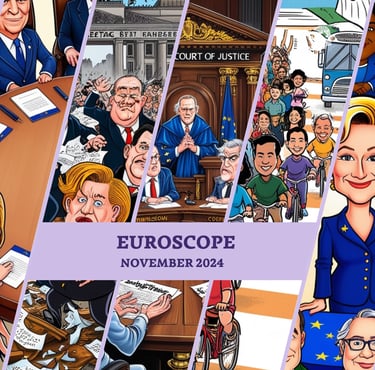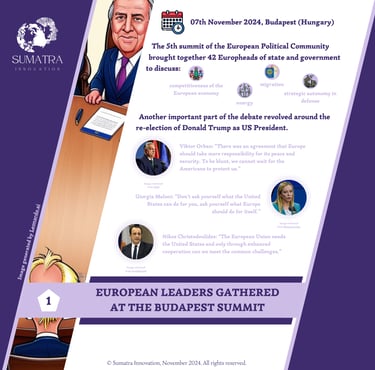Euroscope / November 2024



1/ European leaders gathered at the Budapest Summit to discuss the future of the continent
The fifth summit of the European Political Community brought together 42 heads of state and government in Budapest on Thursday, November 7, 2024. During this one-day meeting, European leaders discussed the competitiveness of the European economy, connectivity issues in energy, transport, IT, irregular migration, strategic autonomy in defense, support for Ukraine and escalations in the Middle East. However, an important part of the debate revolved around the re-election of Donald Trump as US President. Victor Orban (Hungarian Prime Minister), for example, said: “There was an agreement that Europe should take more responsibility for its peace and security. To be blunt, we cannot wait for the Americans to protect us." French President Emmanuel Macron expressed a similar view: “We cannot delegate our security to the Americans forever. We need to be able to defend ourselves", and Italian Prime Minister Meloni insisted: "Don't ask yourself what the United States can do for you, ask yourself what Europe should do for itself". Other European leaders were less outspoken, such as Finnish Prime Minister Petteri Orpo or Cypriot President Nikos Christodoulides, who each said that “Tt (a trade war) should not be allowed to happen. Let's now try to influence the US and Trump's future policy so that he understands it", and that "The European Union needs the United States and only through enhanced cooperation can we meet the common challenges." Despite the different reactions, this reflects the recognition of a Europe that should take on a stronger role as a global player and find a balance between partnership and autonomy in the face of global challenges.
2/ Germany to hold snap elections after the collapse of its coalition
After German Chancellor Olaf Scholz dismissed his Finance Minister Christian Lindner, Linder's party, the Free Democratic Party (FDP), withdrew from the ruling coalition. Deprived of a parliamentary majority, Scholz announced the collapse of his governing coalition, comprising his SPD (Social Democrats), the Greens and the FDP (Liberals), on November 12, 2024. The Bundestag, Germany's parliament, will then be dissolved by Frank-Walter Steinmeier, Germany's president, leading to early elections, scheduled for February 23, 2025, a compromise between the conservatives' proposal for a January vote and Scholz's preference for a mid-March vote. Given Germany's increasingly divided political landscape, the formation of a two-party coalition government is unlikely. Instead, the conservatives, with 32% support, are expected to lead the future coalition government. As they have made it clear that they will not collaborate with the far-right Alternative for Germany (AfD) party, they are likely to work with the Socialists, who could however swap Scholz for Boris Pistorius, Germany's current Defense Minister, and the Greens.
3/ von der Leyen's Pfizergate trial entered the hearings stage
In April 2021, when US pharmaceutical company Pfizer was the EU's largest supplier of Covid-19 vaccines (€2.7 billion), the New York Times reported the existence of text messages between Commission President Ursula von der Leyen and Pfizer CEO Albert Bourla. Despite several requests for access to these messages by various MEPs and the NYTimes, the Commission never made them public. As a result, the European Ombudsman opened a case, requesting disclosure of the messages, and subsequently issued a recommendation that the Commission ask von der Leyen's personal office to search again for the relevant text messages. In both cases, however, the Commission did not provide these messages, nor did it explain why it did not do so. In response, The New York Times took the case to the European Court of Justice (ECJ) in January 2023, with hearings taking place on Friday November 15, 2024. They argued that under the 2001 EU regulation on public access to documents, text messages are considered “documents” and must be preserved and made available on request. In its defense, the Commission acknowledged for the first time that the two men had exchanged messages during the crisis, but denied their importance, claiming that they were “irrelevant” and had no “substantive negotiating content”. A decision is expected in the coming months, as the Court is currently deliberating. Should the Court side with the New York Times, it would set a powerful precedent that could mark a turning point in the landscape of transparency within the EU institutions.
4/ Romania and Bulgaria received green light to join the Schengen area
Following Bulgaria and Romania's application to join the Schengen area in 2011, and their accession by air and sea in March 2024, the interior ministers of Bulgaria, Romania and Austria agreed on full membership on November 22, 2024 in Budapest. Despite Austria's desire to maintain border controls due to irregular immigration at the borders of both countries, Hungarian Prime Minister Viktor Orban took advantage of his rotating presidency of the Council to speed up the accession process. He claimed that Bulgaria had made “fantastic” progress over the years in meeting the Schengen conditions, and highlighted the economic development opportunities this represented for Romanian communities. With the Council's formal decision to lift border controls finalized at the meeting of the Permanent Representatives Committee (COREPER), the vote for formal accession is expected to take place at the next Justice and Home Affairs (JHA) Council, on December 12, 2024.
5/ New College of Commissioners "approved" by the MEPs
Following the hearings of the 26 candidate Commissioners between November 4 and 12, the votes took place in plenary session on Wednesday September 27, 2024. Despite being the lowest majority in EU history (54%), MEPs voted in favor of the new Commission, with 370 votes in favor, 282 against and 36 abstentions. This historic low support is due to the importance of the right-wing in the new College of Commissioners. By entrusting the Italian candidate Rafaelle Fitto (ECR) with the role of Executive Vice-President, groups such as S&D, Renew and the Greens decided to reject von der Leyen's proposal. Yet, this decision also enabled the vdL commissioners to win the support of Meloni's Italian Brothers and Belgium's neo-Flemish Alliance, who had opposed von der Leyen's second term of office last July.




